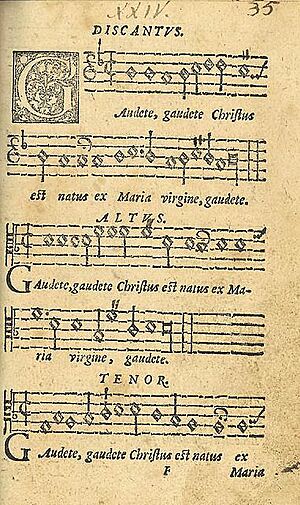Gaudete facts for kids
Gaudete is a very old and famous Christmas carol. Its name comes from a Latin word meaning "rejoice!" or "be joyful!" It's a song that tells people to be happy because Christ has been born. People think this carol was written in the 1500s. It was first printed in a book called Piae Cantiones in 1582. This book was a collection of sacred songs from Finland and Sweden. Even though the book didn't have music for the verses, the tune we know today comes from older church songbooks.
The Latin words of "Gaudete" are like many praise songs from the Middle Ages. It has a simple pattern: a short two-line chorus, called a refrain, followed by four lines of a verse. This pattern repeats throughout the song. Carols from that time could be about many things. But they were often about the Virgin Mary, important saints, or Christmas themes.
Contents
What the Song Says
Here are the words of "Gaudete" in Latin and what they mean in English. The part that says "Rejoice, rejoice!" is the chorus that repeats.
| Latin | English |
|---|---|
| Gaudete, gaudete! Christus est natus Ex Maria virgine, gaudete! |
Rejoice, rejoice! Christ is born Of the Virgin Mary – Rejoice! |
| Tempus adest gratiæ Hoc quod optabamus, Carmina lætitiæ Devote reddamus. |
The time of grace has come— What we have wished for; Songs of joy Let us give back faithfully. |
| Deus homo factus est Natura mirante, Mundus renovatus est A Christo regnante. |
God has become man, With nature marvelling, The world has been renewed By the reigning Christ. |
| Ezechielis porta Clausa pertransitur, Unde lux est orta Salus invenitur. |
The closed gate of Ezekiel Is passed through, Whence the light is risen; Salvation has been found. |
| Ergo nostra contio Psallat iam in lustro; Benedicat Domino: Salus Regi nostro. |
Therefore, let our assembly Now sing in brightness Let it bless the Lord: Greetings to our King. |
Famous Recordings of Gaudete
Many different groups and singers have recorded "Gaudete" over the years. Here are some of the well-known versions.
1970s Hit Song
- The British folk rock group Steeleye Span made "Gaudete" very popular in 1973. Their version was sung without any instruments, which is called a cappella. It became a big hit in the UK, reaching number 14 on the music charts. This was special because it was one of the few songs sung entirely in Latin to become a hit. When Steeleye Span performed it on the TV show Top of the Pops, dancers wore medieval robes and carried candles.
Other Notable Versions
- In the 1980s, a Finnish singer named Pertti Neumann recorded "Gaudete" for his album Albion.
- The King's Singers, a British vocal group, included "Gaudete" on their 1990 album A Little Christmas Music.
- The Boston Camerata also recorded a version in 1985 for their album A Renaissance Christmas.
- The Irish choral group Anúna performed "Gaudete" on their 1996 CD Omnis. They later released another version on their 2007 CD and DVD Celtic Origins.
- The female vocal group Mediæval Bæbes recorded it in 1997 for their album Salva Nos.
- In the 2000s, a group of Dominican friars from Poland recorded a choral version.
- The British boy choir Libera included "Gaudete" on their 2001 album Luminous. They have also featured it on several Christmas albums.
- The German medieval rock band Schelmish performed "Gaudete" on their 2006 album Mente Capti.
- In 2013, the British synthpop group Erasure released an electronic version of "Gaudete". It was the first single from their Christmas album Snow Globe. This version also did well on the music charts.
- The St. Paul's Cathedral Choir included the song on their 2015 Christmas album.
Fun Parodies
Sometimes, people make funny versions of famous songs, called parodies.
- In 2013, a British folk duo made a parody of "Gaudete" called "Crudités".
- In the TV comedy I'm Alan Partridge, the character Alan Partridge sings along to the Steeleye Span version of "Gaudete" in his car. He sings it in a very over-the-top way, which is meant to be funny.
 | Bayard Rustin |
 | Jeannette Carter |
 | Jeremiah A. Brown |


